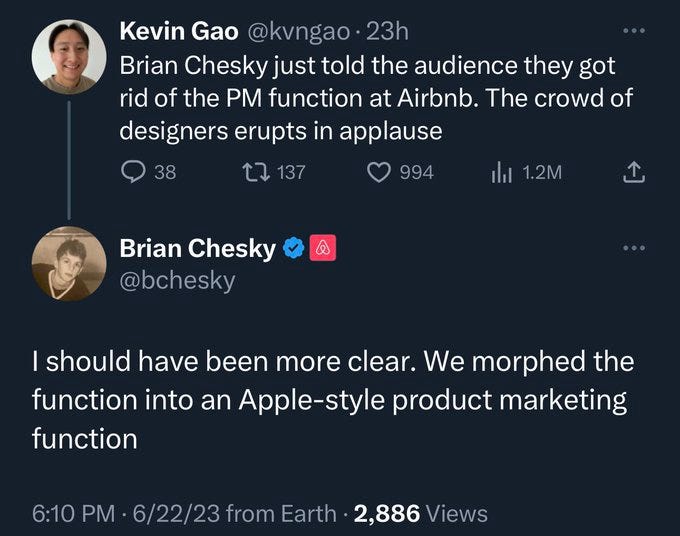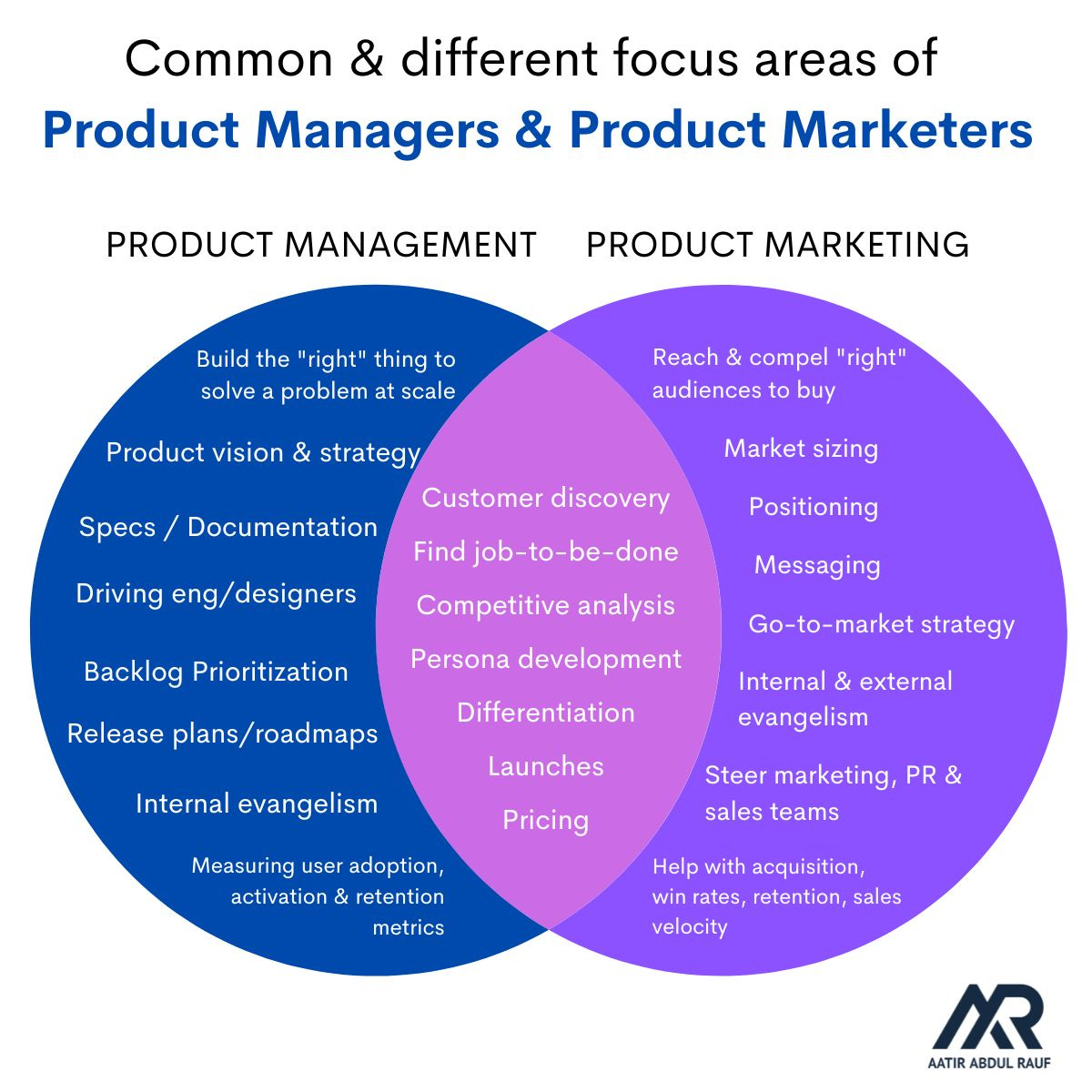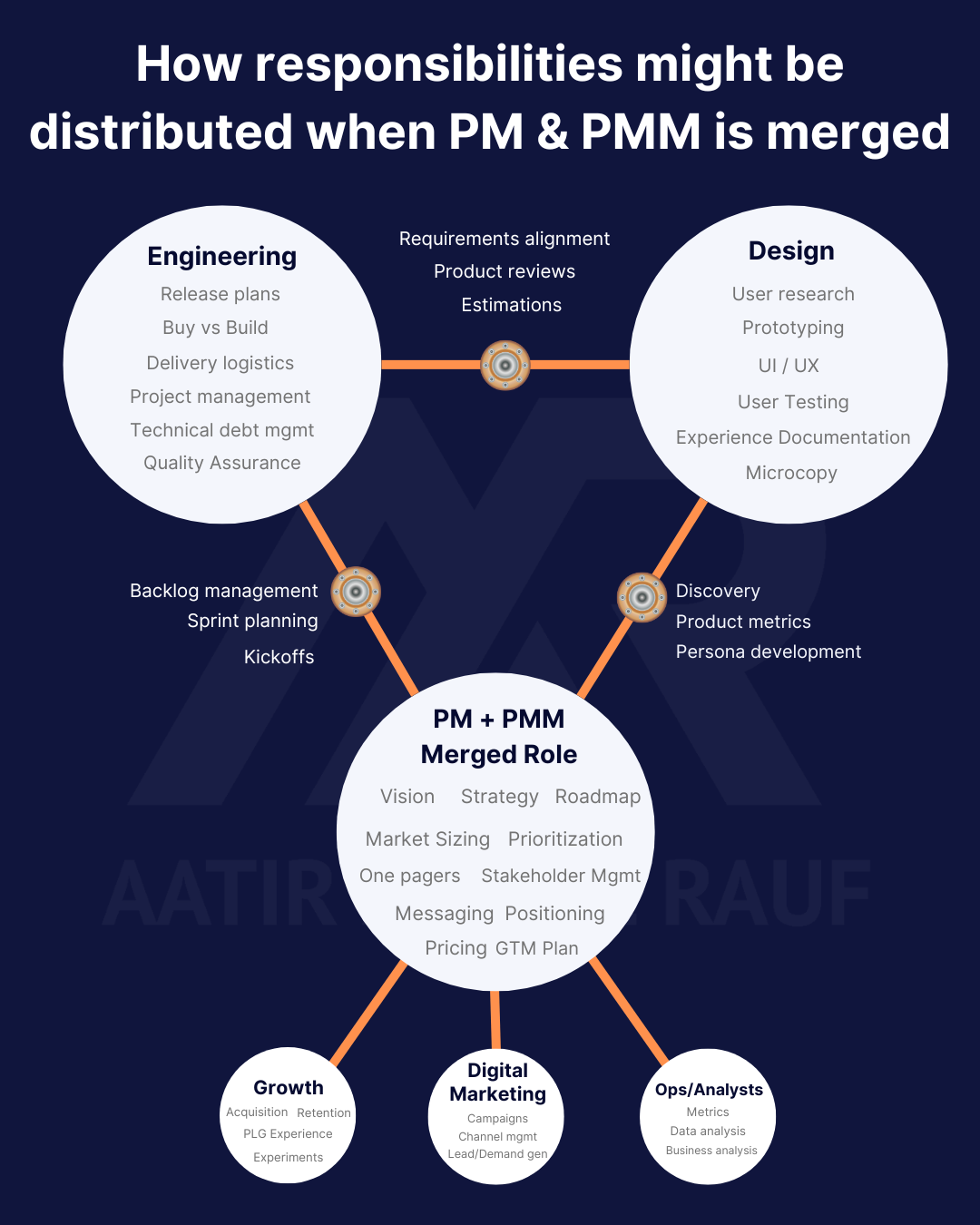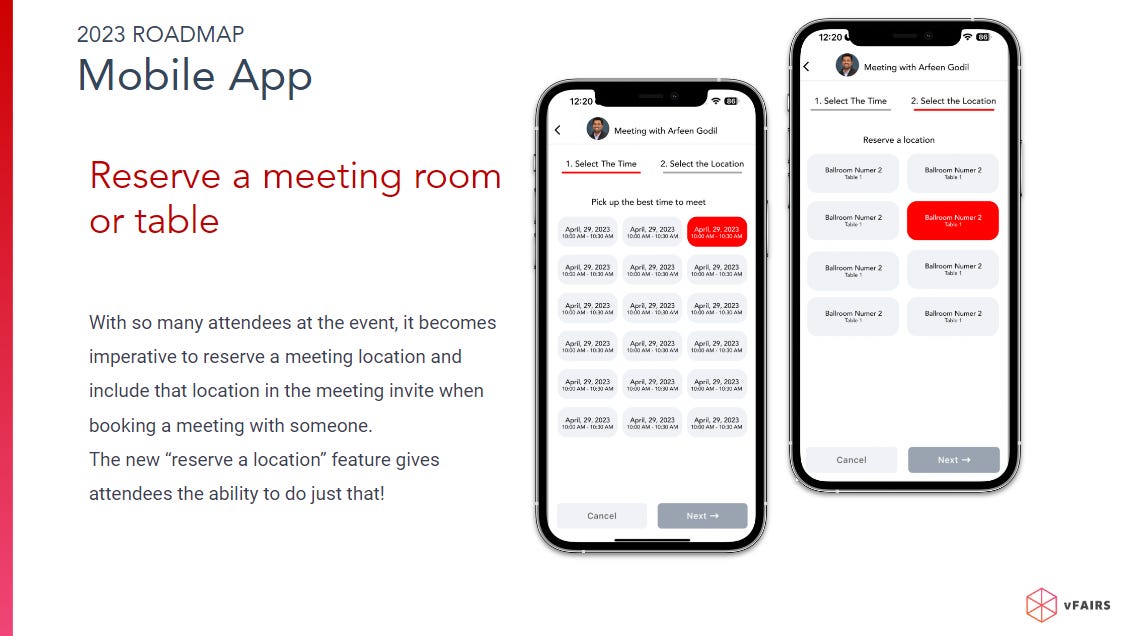Why did Airbnb combine Product Management with Product Marketing?
+ What PMs can learn from PMMs and vice versa
Hey BPL fam,
The story about Airbnb getting rid of the PM function has been making rounds in the past few days. The conversation is heating up.
I thought I’d share some thoughts with the community regarding the topic. The only reason I’d like to drop my $0.02 is because I’ve worked in a PM/PMM fusion role for 9 years at vFairs & Bayt.com.
In this edition of Behind Product Lines, you’ll find:
Recap of what happened
Quick takes on Airbnb’s move to merge PM & PMM roles
What Product Managers can learn from Product Marketers (& vice versa)
Alright then, let’s dive in.
Recap of what happened
It all started on June 21, 2023 at Figma’s Annual conference.
Dylan Field (co-founder Figma) was hosting a conversation with Brian Chesky (CEO of Airbnb) in a session titled “Leading through uncertainty”. You can watch the full video here.
Dylan asked Brian about his experience of how design leads the way in Airbnb. Brian talked at length about his journey from being a designer to becoming CEO & his aspirations to finally see a designer lead a successful enterprise.
Then, 12 minutes in, Brian dropped this little nugget:
“…The designers are equal to product managers. Actually, we got rid of the classic product management function. Apple didn’t have it either.
* 5-second applause *
(smiling) Let’s be careful. Hold on.
We have product marketers. We combined product management with product marketing and we said you can’t develop products unless you know how to talk about the products. We made the team much smaller and we elevated design.”
Boom.
This hot take was packaged into tweets like below that perhaps made the statement spicier than it really was:
Shortly after, the tech community broke into several factions & weighed in with a swathe of mixed perspectives.
Some “poked the bear” & needlessly stirred the pot:
…while others opted for more balanced opinions:
A few of the stances on this matter:
“Product Management can’t operate without talking about go-to-market. It’s about time that we make it one role.”
“It’s premature to think that one person can handle both roles. It’s too much to ask from one resource.”
“Design was already doing what Product Managers do for years. PMs were an unnecessary layer.”
Peter Yang went on LinkedIn to quote Tony Fadell to show support for Airbnb’s decision:
Needless to say, the conversation has picked up steam over the past few days.
PMs are taking defensive stances, PMMs are running victory laps, Design is loving the elevated respect.
Quick takes on Airbnb’s move to merge PM & PMM roles
1. Why did Airbnb choose to drop the classic Product Management function?
You have to listen to the entire conversation to understand this. Here are the main pointers:
Brian was tired of seeing multiple roadmaps & sub-roadmaps. He wanted one large roadmap that showed the holistic progress of the company towards its vision.
He implemented a rule: If a feature isn’t on the master roadmap, it can’t ship.
Then, he wanted to prioritize 10% of the roadmap & only take a few big bets.
To execute these big bets, he wanted to create small, focused teams of smart people that felt proud of what they shipped & felt in control. Product, design, engineering were put on an equal footing to distribute that ownership.
He then noticed that ownership would only come if the Product Managers not only developed & built the product but ALSO knew how to talk about it & promote it to customers. He wanted to cut down the resource bloat & eliminate the divide.
That’s why he merged both functions to enable PMs to embrace the end-to-end of each product increment.
But if you read between the lines, Brian was talking more about how designers, when empowered, can drive the product and eventually lead companies.
2. Airbnb didn’t kill PM. They relabeled it & consolidated their team roles.
You still need someone to lead conversations around why & what needs to built. The essence of product management still remains even if a different title is leading it. Also, I didn’t see much evidence of product designers governing strategy and roadmap.
The morphed role will retain that and just adopt more marketing duties.
3. Can one person handle both roles? Isn’t that too much?
If you take the union of all activities, it is a lot to handle, especially when you’re working in a mature product organization. Moreover, depending on the market, you’ll be hard-pressed to find people who can carry both mantles confidently.
Having said that, it is “technically” possible with conditionality.
When I worked at startups like Pakwheels, I naturally had to wear multiple hats like Product, Growth & Marketing. However, I would switch between the modes in cycles. I’d work hard on a couple of “building” sprints after which I’d lean heavy on go-to-market and market plans before looping back.
But when working with more mature product lines with a larger marketing footprint, I had to create smart delegation structures to be able to drive both ends.
One needs to also realize that the PMM & PM function historically have had some overlapping activities namely customer discovery, persona development, competitive analysis & launches. The diagram below helps visualize this.
Now, if the proposal is to merge both roles, the only way that can happen is offload execution ownership to other parties. For example, I imagine backlog management & delivery logistics will solely be owned by engineering.
However, the vision, strategy, research & prioritization aspects will still be owned by the morphed role.
Also, note that with the rapid rise of AI, certain areas like data analysis & spec documentation will get commoditized. This will further reduce the burden from the product team.
Below is a suggested distribution map of how the classic Product Manager duties might be spread out between different departments (list is not exhaustive). The roles on the vertices indicate collaboration points (note: the circle sizes do not indicate significance):
4. It’s an Airbnb decision. It’s not a decree for all.
The discussion quickly escalated to become an existential question for Product Managers & whether they are needed.
People need to realize that just because Airbnb is doing this doesn't mean:
it works for every other company.
product management is doomed.
it will never be challenged or modified.
The nature, dynamics & stage of their product is unique to them.
Google, Microsoft, Slack, Notion, Miro - all still employ product managers and will continue doing so for the foreseeable future. PM jobs are not going to vanish overnight on Indeed.com either.
Let’s not forget that Airbnb has existed for 15 years now.
They’ve built their own frameworks, have balanced product-market fit, drive massive revenue, have mature engineering processes and boast senior leadership that can carry the ship.
They can create a merged role because it’s seemingly the next natural step for their evolution.
Such decisions shouldn’t be taken as universally applicable.
It’s like how Tesla decided to call in employees for on-premise work after the pandemic tapered out (& eliminate the remote work option). The world gasped at their decision. But just because Tesla did it, didn’t mean everyone had to fall in line. And just because the world did something different, didn’t mean Tesla had to follow suit.
The world isn’t that black and white.
5. Evolving the Product Manager role is a debate to be had.
Building a product is just half the battle won.
Preparing go-to-market plans, working on the right messaging & thinking about positioning is equally critical. PMMs historically have owned this but so much context lies with the PM that it's only natural for them to be a major contributor.
Even though the sum of all PM and PMM activities might be too much (without effective distribution of ownership), I strongly feel that Product Managers need to learn the Product Marketing lens to be more effective and vice versa.
More on this now ↓
What Product Managers can learn from Product Marketers & vice versa
Whether you merge the role or not, I can safely say that learning about Product Marketing helps PMs in their job (and the other way around).
First off, how do both roles differ?
👉 STRATEGY
PMs build product strategy to achieve business metrics, target user personas & build roadmaps.
PMMs identify favorable segments in the Target Addressable Market & create go-to-market plans to favorably bring the product in front of them.
👉 TACTICS/ACTIONS
PMs conduct discovery, write specs, work with designers to build prototypes, drive engineering to build & release a product increment.
PMMs create marketing campaigns, messaging & creative briefs, push them into distribution channels like website, search, social & email marketing to get the word out.
👉 METRICS
This varies from product to product but generally:
PMs focus on product adoption, utilization, engagement metrics like Revenue, MAUs, NPS, Churn rate.
PMMs might also report on similar metrics but also care about MQLs, CAC, Lead to Demo rates, CPC etc.
👉 FOCUS
PMs focus on defining the product & developing the right thing.
PMMs focus on positioning the product in front of the right audiences & creating a linear path to purchase.
What do they have in common?
1. Both research the underlying pain points of the audience & figure out the job-to-be-done.
2. Both perform competitive analysis & play a part in pricing.
3. In case of PLG-enabled products, both are involved in the acquisition part of the funnel.
How the Product Manager role informed my marketing role
Knowing the product constraints better, I was able to avoid fluff & false claims during messaging.
Example: when I was building out recruitment tech products, I was acutely aware of the limitations our integrations with other data sources had. Deeper understanding of that allowed me to frame messaging that was more accurate & didn’t pull in the wrong expectations.
Since I knew about the capability of the product well, I was able to come up with more applications & identify more audience segments.
Example: we once built a lightweight resume capture tool. Our customers were using it at recruitment events as a way to capture candidate info digitally. However, as I was doing persona development, keyword demand research & discovery, I realized that the same could be easily used for office receptions to capture resumes from walk-ins.
As I knew the product roadmap well, I was able to shape longer-term narratives with marketers & create effective GTM campaigns.
Example: As a Product Manager, I had split the evolution of features into phases. I had a fair idea of what I was going to launch by Q4 of the year (if all went to plan), at least for certain features that were critical for success. This allowed me to plan my content marketing strategies accordingly & lean in on demand generation for the end-goal product.
I was able to create customer-facing roadmaps quickly as I had the mockups on my drive (or in my head).
Example: Since I had clarity on what the feature would end up looking like (or I had worked on it with design), my customer-facing roadmaps were more visual in nature:
Let’s flip the script.
How the Product Marketer role informed my product management function
The art of messaging taught me the importance of microcopy across my product. (e.g. headlines, blank states etc.).
Example: My marketing experience helped me create concise and compelling headlines & empty states for our recruitment SaaS product, leading to an increase in click-throughs & feature adoption.
It helped me become a better storyteller for my tech team, giving them a movie-like walkthrough of what the hero (customer) goes through.
Example: I was able to express a feature's importance by narrating a story to the development team about a recruiter’s struggles without that feature. Using frameworks like Pixar storytelling or Problem-Agitation-Solution. This not only increased their understanding but also their ownership.
It helped me get clarity on a feature's value by attempting to express it's value from a customer perspective.
Example: I strongly feel product marketing made me think of prioritization in a different way. What would be the better story to pitch to a customer and what would they resonate with more? When I wrote the specs of our budget management system, I first thought of what content or capabilities would genuinely excite an HR director.
I learnt things like audience research, SEO, customer journey maps, positioning & branding which helps in consistent product design & effective discovery.
Example: Understanding search trends and volumes not only played a part in copywriting but also surfaced intent of users and how they think about a problem.
My take?
At the very least, every PM should take time out in their career to learn more about product marketing and vice versa.
I also want to take this opportunity to address a sentiment that started cropping up on social media:
Too many cooks spoil the broth. Design can own the product function without the need of PMs. After all, they do most of the grunt work & own execution.
Now, here's the challenge. When we say that design already does most of the work that product does, we're assuming all companies think of "design" the same way.
At Airbnb and Apple, design may be pulling the weight of discovery & prototyping.
But when you step outside big tech, things are very different.
I've been in teams where design is reluctant to own strategy, documentation, specs and/or liaise with engineering - all necessary items in the PM portion.
And once you move over to emerging markets, design is seen differently altogether I.e. someone who does UI/UX & manages the pixels.
Regardless of what's right or wrong, the ground reality is that the "ownership" of design lives on a spectrum.
And thus, Airbnb's move doesn't translate well for everyone. It works for them and it should be kept that way.
To sum up, Airbnb took a decision that works well for them. My personal learning from this is that the role of design needs to be elevated & Product Marketing as a discipline needs to be highlighted more at companies.
But apart from that, product managers should stop biting their nails. The function is here to stay and it’s critical for the success of so many startups out there.
Keep calm & keep shipping.









Good read and insights.
Superb content :)